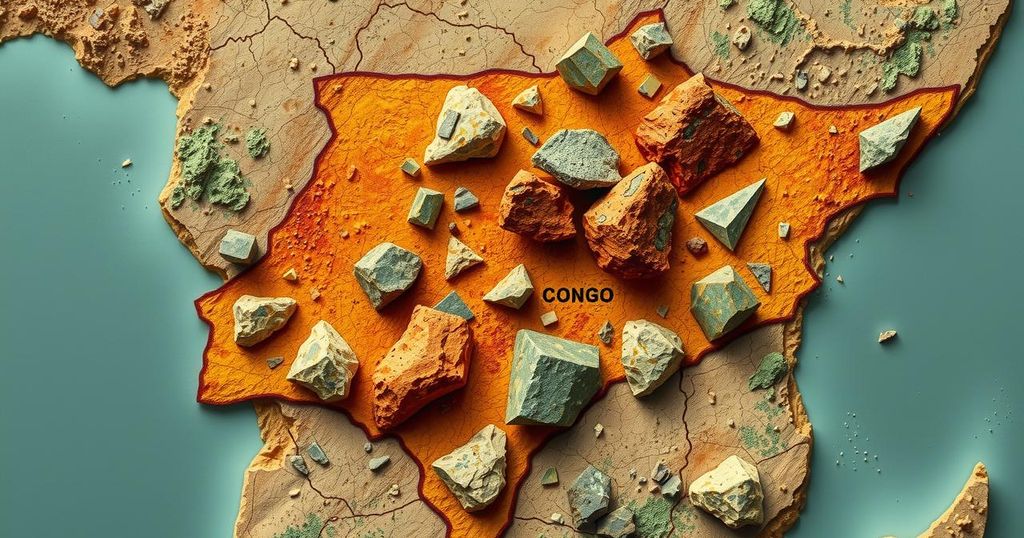The DRC’s Strategic Pursuit of a Minerals Deal with the U.S.

The DRC is seeking a minerals-for-security deal with the U.S. amidst escalating violence from the M23 rebel group, aiming for potential troop deployments or military support. The DRC’s proposal is propelled by a desire for security partnerships similar to U.S. assistance to Ukraine. Congolese officials have outlined potential benefits for both nations in a letter to U.S. Secretary of State, while the region continues to grapple with persistent armed conflict and foreign influence in resource management.
The Democratic Republic of the Congo (DRC) is actively engaging with the United States government to secure a minerals-for-security agreement amidst escalating violence due to the rebel M23 group. Congolese officials are conducting daily discussions with U.S. representatives to explore possible troop deployments by the U.S. to help stabilize the conflict-torn nation. This initiative has arisen in light of the alarming death toll and displacement of thousands since the onset of this conflict, primarily occurring in mineral-rich areas.
The DRC’s motivation for pursuing this minerals deal now appears influenced by U.S. support for Ukraine, which includes offering a substantial share of its mineral revenues. Congolese officials see a parallel in the potential for a similar arrangement that would also ensure security capabilities against the M23 and other militant groups that dominate local resources. The DRC possesses vast natural wealth, estimated at $24 trillion, primarily in the form of minerals critical to modern technology.
On February 21, a letter from the Africa Business Council reached U.S. Secretary of State Marco Rubio, advocating for investment in DRC’s mineral resources. This correspondence represents a formal proposal from Senator Pierre Kanda Kalambayi, suggesting a long-term economic and security partnership with benefits for both nations. Suggested measures include U.S. access to DRC’s mineral resources, a joint mineral stockpile, and military training and equipment for Congolese forces.
The ongoing armed conflict in the DRC has persisted for over three decades, primarily due to governmental corruption and weakened armed forces. The current focus for President Felix Tshisekedi is to eliminate the M23 group, which has captured significant towns vital for mining operations. This issue is further complicated by the involvement of neighboring Rwanda, which has been accused of supporting M23, illustrating the interconnected nature of regional conflicts and resource exploitation.
Economic considerations also motivate the U.S. to engage with the DRC, as direct access to the Congolese government’s mineral reserves could facilitate access to critical minerals. Past agreements with China in the minerals sector have been criticized, and under Tshisekedi’s leadership, there is a pronounced intention to invite foreign investments beyond China. A willingness to embrace U.S. investment is evident, as highlighted by government spokesperson Patrick Muyaya’s comments on the prospects for American capital in the DRC’s resources sector.
The future relationship between the DRC and the U.S. remains uncertain, especially regarding the potential for formal agreements. While the U.S. has shown interest in investments, there are no active U.S. corporations in the DRC. Under the Trump administration, the collaboration could evolve into a transactional relationship distinguished from previous U.S. engagements. However, experts remain skeptical about the immediate impact of U.S. military equipment on the ongoing conflict, suggesting a more gradual strengthening of the Congolese military capabilities is likely.
In conclusion, the DRC’s pursuit of a minerals-for-security deal with the United States signifies a strategic effort to leverage its rich natural resources amid ongoing armed conflict. With rising violence from the M23 and other groups, the DRC seeks to partner with the U.S. for stability while piquing American interest in its minerals sector. Although there is potential for future engagements and investments, the complexities of regional dynamics and prior foreign influences complicate the outlook for significant progress in the near term.
Original Source: www.aljazeera.com








